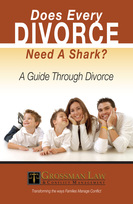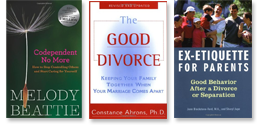Are You Unknowingly Alienating Your Child?
Bill Eddy is an attorney and Licensed Clinical Social Worker who has written extensively on topics related to divorce and children of divorce. He points out that a parent may be unknowingly alienating their child against the other parent (or even themselves). It may be unknowing because the parent is sharing intensely negative emotions to the child about the other parent without giving it much thought. They may have lost self-control because they are consumed with feelings of anger, disappointment, and betrayal. This is not an uncommon scenario.
Eddy's suggestion is that the parent who is sharing these negative emotions about the other parent should learn to help their children with positive and repairing statements. He describes positive and repairing statements as:
1. POSITIVE COMMENTS: Regularly point out positive qualities of the other parent to your child.
2. REPAIRING COMMENTS: All parents make negative comments about the other parent at times. If you realize you made such a comment, follow up with a “repairing comment”: “I just spoke negatively about your father [or mother]. I don’t really mean to be so negative. He has many positive qualities and I really value your relationship with him. I’m just upset and my feelings are my responsibility, not his and not yours.” OR "I just said something negative, and I'm sorry I said that."
3. AVOID REINFORCING NEGATIVE COMMENTS: Healthy children say all kinds of things, positive and negative, about their parents – even about abusive parents. If there is abuse, have it investigated by professionals. If not, be careful that you are not paying undue attention to their negative comments and ignoring their positive comments.
4. TEACH PROBLEM-SOLVING STRATEGIES: If your child complains about the other parent’s behavior, unless it is abusive, suggest strategies for coping: “Honey, tell your father something nice before you ask for something difficult.” “Show your mother the project you did again, she might have been busy the first time.” “If he/she is upset, maybe you can just go to your room and try not to listen and draw a picture instead.” "Why don't you try..."
5. AVOID EXCESSIVE INTIMACY: Children naturally become more independent and self-aware as they grow up. Be careful not to be excessively intimate with your child for the child’s age, as this may create an unhealthy dependency on you. Examples include having the child regularly sleep with you in your bed beyond infancy; sharing adult information and decisions (such as about the divorce); and excessive sadness at exchanges or how you miss the child when he or she is at the other parent’s house.
6. AVOID EXCESSIVE COMPARISONS: When you emphasize a skill or characteristic that you have, don’t place it in comparison to weaknesses of the other parent. You each have different skills and qualities that are important to your child. By comparing yourself positively and the other parent negatively (even if this feels innocent), you can inadvertently influence your child. Remember that your child is a combination of both of you, and thinking negatively of one parent means the child may think negatively about half of himself or herself.
In order to recognize their alienating behavior and develop strategies to make positive and repairing statements, the parent should consider meeting with a therapist.
Eddy's suggestion is that the parent who is sharing these negative emotions about the other parent should learn to help their children with positive and repairing statements. He describes positive and repairing statements as:
- Supportive statements of the other parent
- Encouraging child's positive statements about other parent
- Discouraging child's negative statements about other parent
1. POSITIVE COMMENTS: Regularly point out positive qualities of the other parent to your child.
2. REPAIRING COMMENTS: All parents make negative comments about the other parent at times. If you realize you made such a comment, follow up with a “repairing comment”: “I just spoke negatively about your father [or mother]. I don’t really mean to be so negative. He has many positive qualities and I really value your relationship with him. I’m just upset and my feelings are my responsibility, not his and not yours.” OR "I just said something negative, and I'm sorry I said that."
3. AVOID REINFORCING NEGATIVE COMMENTS: Healthy children say all kinds of things, positive and negative, about their parents – even about abusive parents. If there is abuse, have it investigated by professionals. If not, be careful that you are not paying undue attention to their negative comments and ignoring their positive comments.
4. TEACH PROBLEM-SOLVING STRATEGIES: If your child complains about the other parent’s behavior, unless it is abusive, suggest strategies for coping: “Honey, tell your father something nice before you ask for something difficult.” “Show your mother the project you did again, she might have been busy the first time.” “If he/she is upset, maybe you can just go to your room and try not to listen and draw a picture instead.” "Why don't you try..."
5. AVOID EXCESSIVE INTIMACY: Children naturally become more independent and self-aware as they grow up. Be careful not to be excessively intimate with your child for the child’s age, as this may create an unhealthy dependency on you. Examples include having the child regularly sleep with you in your bed beyond infancy; sharing adult information and decisions (such as about the divorce); and excessive sadness at exchanges or how you miss the child when he or she is at the other parent’s house.
6. AVOID EXCESSIVE COMPARISONS: When you emphasize a skill or characteristic that you have, don’t place it in comparison to weaknesses of the other parent. You each have different skills and qualities that are important to your child. By comparing yourself positively and the other parent negatively (even if this feels innocent), you can inadvertently influence your child. Remember that your child is a combination of both of you, and thinking negatively of one parent means the child may think negatively about half of himself or herself.
In order to recognize their alienating behavior and develop strategies to make positive and repairing statements, the parent should consider meeting with a therapist.


